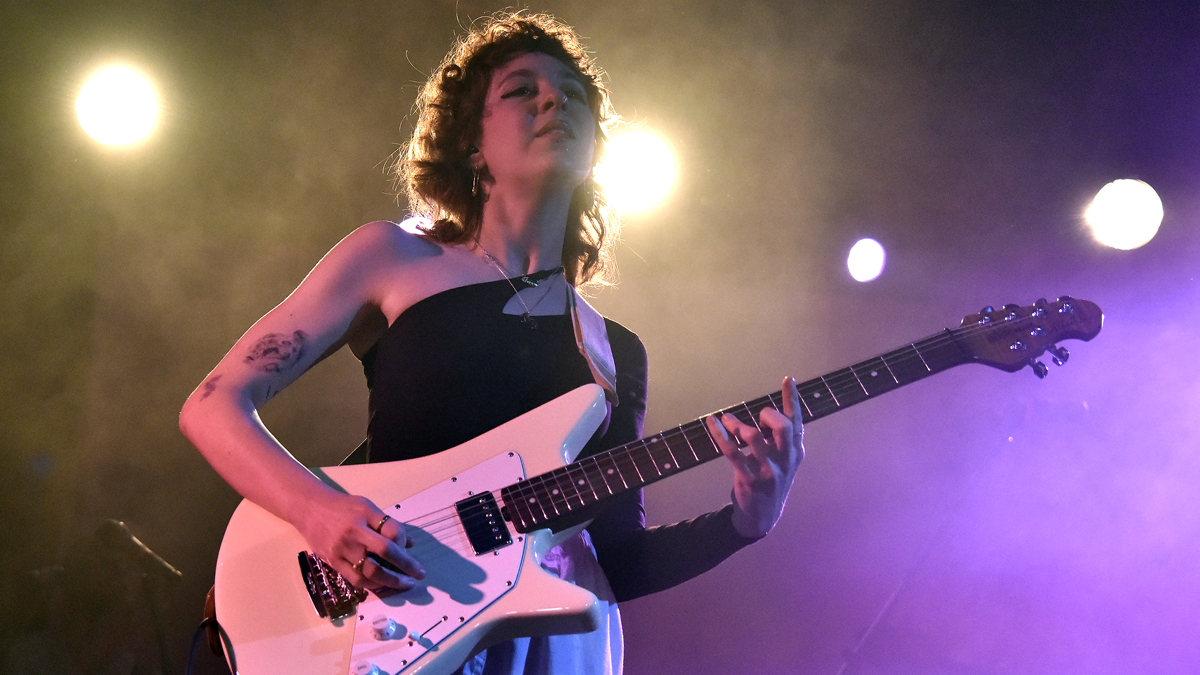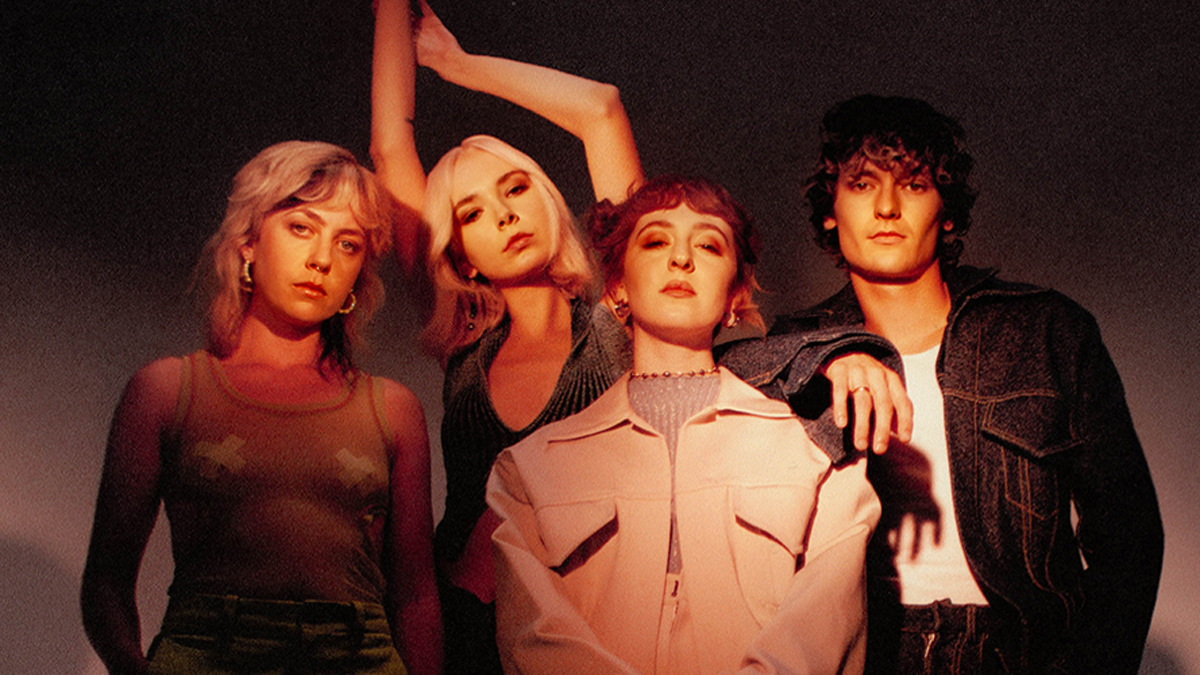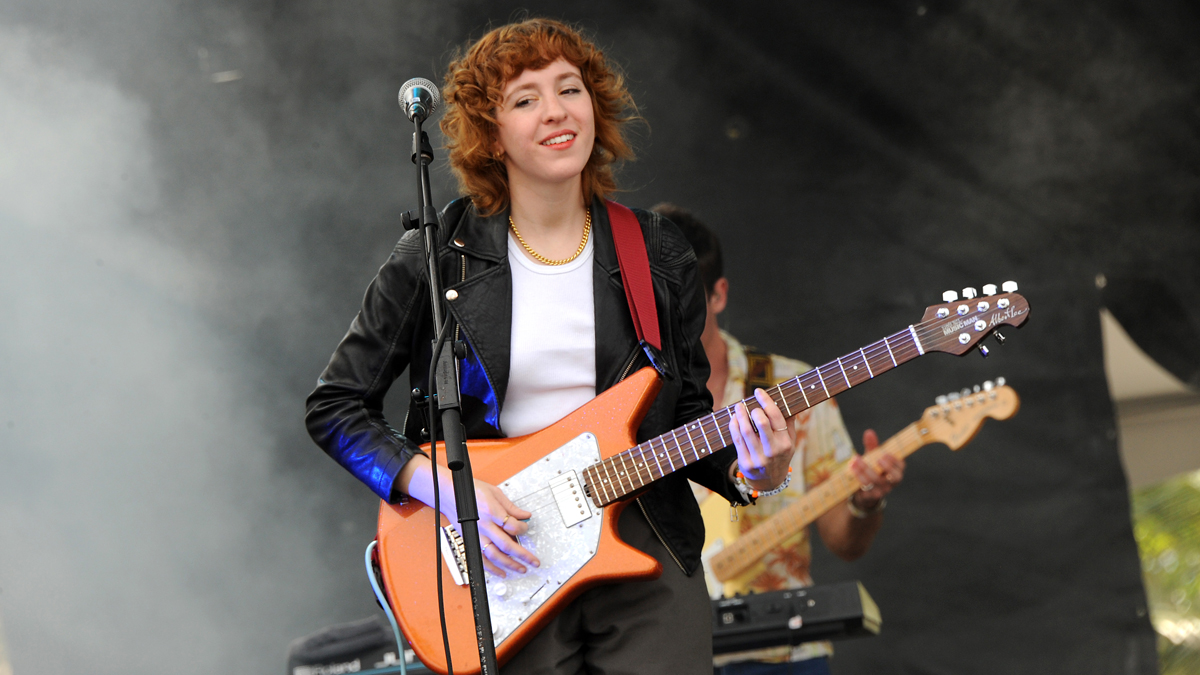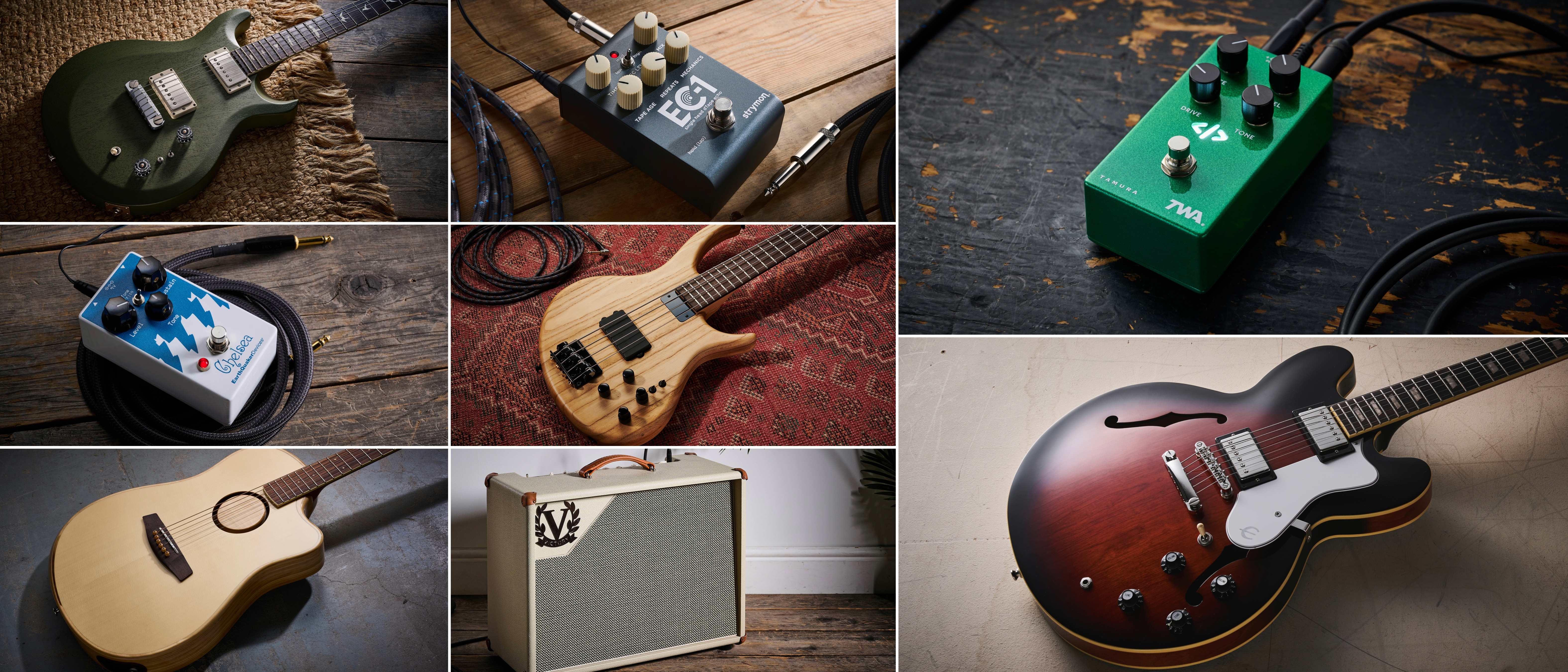The Regrettes' Genessa Gariano: "There’s a power I feel when I’m holding a guitar. It lets me be something other than what I am physically"
The Regrettes guitarist discusses the amp that helped them find their sound, the group's world-beating chemistry, and how St. Vincent inspired their continued love of guitar

Genessa Gariano is the lead guitar player for the Los Angeles-born band, The Regrettes. The group, who rose to popularity with a string of guitar-driven albums, now have a new record, Further Joy, under their belt that, unlike the rest of their repertoire, is far more selective with its six-string placement. It uses the instrument in tasteful, textured and subtle ways, as opposed to how a traditional garage-rock, guitar-forward album might with its buzzy, fuzzy smacks and punches.
The Regrettes imbue joy in their audiences. The chemistry and camaraderie among the members is palpable, and it’s a big reason why the group has booked gigs at Coachella and Bonnaroo this year, among many more.
We caught up with Gariano to talk to them about their guitar-playing origins, letting go of genre on Further Joy and what they love most about their chosen instrument.
Both you and lead singer Lydia Night both play guitar in The Regrettes. What was the musical chemistry like, especially from a guitar perspective, with the band early on?
“That’s actually really interesting. Lydia and I went to School of Rock together, so we had played together before, but never just her and I with a band, you know? It was never quite an experience like that. There was no learning curve – I feel like we naturally fell in line.
“Lydia is an incredible guitar player, too. But if she was singing, it was easy for me to pick up the lead parts. If there was a lead part that she wrote and had room to play, she’d play it and it was great. I feel like we just naturally found our way together. I’ve never even thought about it. I guess that’s how easy it was.“
Is there a moment that you can point to that really crystallized your style working together, in the band or on the guitar, specifically?
All the latest guitar news, interviews, lessons, reviews, deals and more, direct to your inbox!
“The first time we ever wrote together. We hadn’t been playing together for very long and we went to a Fender showroom. We grabbed some guitars and we just started writing out of nowhere, and it felt like a magic moment. I don’t remember everything just because it felt like such a special time.
“We wrote this song called Lacy Loo that’s on our first album. I think that was the moment we wrote together and I was just like, ‘Wow! This is what it feels like to write with someone and feel like it was a true collaboration.’ The energy and all of that was just so beautiful.“
Are there any specific pedals or amps that are must-haves when it comes to you, your playing style and the band’s overall sound?
“I have an Ernie Ball Music Man Albert Lee and that thing is just my special sauce, along with... I mean, all of my gear! I’m very attached to my gear. When we’re not touring, I play a Matchless Chieftain and that guy is amazing, but I had to stop touring with it because it’s super-fragile. I have a Kemper Profiler now and I have it profiled in that. So, I still play it, but it’s obviously not the real deal.
Playing the Matchless Chieftain, that's where I found my style. I think I found my little space with that amp
“It has such an incredible warm tone. I think it’s what helped me find my style, playing through that, especially when I was younger. It was also my brother’s and I bought it off of him. That’s where I found my style, because it has a really dirty drive. And that was the first time I really played with a drive like that, other than a few little pedals that I had at the time.
“I had never been able to get a really solid drive before, and that was a special time to get one that wasn’t overwhelming or too tone-y. I think I found my little space with that, my Matchless Chieftain.”
Any pedals especially important to you and your playing style?
“Yeah! The amp along with the Fulltone Full-Drive III. I’m on my, like, fourth version of that pedal. I love it. It’s my go-to drive. Again, it’s something that can really cater to what you’re trying to play. You can pull it back or push it forward into a really heavy drive, and it has a solid boost on it. I keep that on most times right now. It’s almost always on when I’m playing."

Do you think about the guitar or its sound differently when it comes to playing the instrument live, in the studio or even on late night television shows?
The guitar doesn't need to be the first thing that you hear on a song. It can be just as beautiful when it teeters around the edges
“It depends on the song. I don’t think the guitar always needs to be the first thing that you hear. I think it can be just as beautiful when it kind of teeters around the edges of a song. But it really does depend on what you’re playing. Live versus, like, on Conan, I was doing what I do live pretty much exactly the same for that.
“But in the studio, I definitely tend to be a little bit more timid at first when coming into a song, especially with our new album. I’m trying to be tasteful. I want it to be fresh and something that I’d listen to, and I don’t listen to as much guitar-based music anymore. I like it when the guitar is sometimes doing something a little bit more fresh or a little different.
“A lot of times we’ll even use just a voice memo of an acoustic guitar and then mess that up. So, I think it’s really exciting, the new sounds that we’re getting out of it in the studio.”
How did you think about the guitar on the new album? It’s obviously less guitar-forward compared to past records. What was your mindset with the instrument going into writing and recording the new LP?
“On first listen, you don’t really realize how many guitars there are. But there are so many guitars in all of these songs. A lot of them are hidden, kind of pulled back, skirting around the edges in a way that I think is really exciting. I feel that it taught me a lot working on these [songs] because our past records were very guitar-based.
“But I had so much fun noodling, recording and then messing the guitar parts up in the studio, just pushing the boundaries of what I’ve ever done personally. It was such a joy!”
Something that shows itself both in the history of your band and on the new album is a desire of the members to empower people, especially from a queer perspective. Traditionally, the guitar has been associated with white straight guys. So, what was it like for you to do so through the lens of the guitar?
“I don’t think about it when we’re working on things. I think, 'I’m just me. I’m just Genessa creating.' But definitely in hindsight... I’m non-binary, so I think I would have really appreciated someone like that in a band that I liked. I grew up with a lot of men guitar players around me and I felt like, because the guitar was big on my body and it looked so much cooler visually [with them], they could command a guitar better than I could.
“And I actually found Annie Clark – St. Vincent – and she was the person who kind of made me continue playing because of that. And I’ve gotten messages from people who have said that I’ve inspired them. That’s a really cool thing. And if I could do that for one person, that’s so freaking special! So, being queer in music, I don’t think about it constantly but when I do, it’s really exciting and also I’m so thankful to be accepted.
“I have just been so fortunate for everyone who I’ve worked with, everyone I’ve met has just been so respectful. It’s mind-blowing. I appreciate it so much more than I could ever communicate. It’s a really special time to be in music, surrounded by fellow queers and all of that. I think it’s beautiful.”
Have you met St. Vincent? Or are there other people you look up to you’ve gotten to talk to about the instrument? I know The Regrettes went on tour with Tacocat, which must have been fun.
“First of all, Tacocat was one of our first tours. It was the greatest experience ever. They just inspired us to be good people on tour. Even as openers, the way they treated us with respect, I think about that constantly. But coming back to queer people, I actually haven’t met really any of my idols in music. I’ve met a lot of people and had those conversations, but a lot of it was with my queer friends, who are both musicians and not.
“I think they just are the ones: the people we’re friends with. Like, my friend is out playing guitar with Claud [Mintz, pop singer-songwriter] right now and they have always been someone who I have confided in and talked to, and we’ve pushed each other to really be open and adaptable with who we are. So, I think a lot of my peers are really the ones who I’ve looked up to.
“But someone like Annie Clark, who is a queer woman, she pushed me to continue playing guitar when I felt like maybe I was a little lame. I was like, ‘Hmm, is this something that’s worth pursuing? Is there a place for me in this world here?’ And I found her and I was like, ‘Okay, I guess there might be!’”

On the new record, there is a lot about taking time and not putting tons of pressure on yourself. But at the same time the band is constantly touring, writing and achieving. As you look to the future, how do you think about it given this dichotomy?
“I think we definitely had our break. Our time to relax was the past two years when we weren’t able to tour. So, we really got that out of our system, the self-reflection and introspection. I think now it’s time to go out and learn from the world outside of us, to improve.
“We talked about the title of Further Joy lot when we were [first] writing [the album] in Joshua Tree. It's about how the pursuit of joy can oftentimes suck the joy out of everything that would have brought happiness had you not been chasing something. I think so much of what we’re doing now is just really checking in and seeing if we’re happy. Because we want to tour!
I am more excited about this album than anything we’ve ever done before. Our band chemistry is so incredible
“I am personally more excited about this album than anything we’ve ever done before. I feel like I just have a better head on my shoulders and I think we all do. And our band chemistry is so incredible that I think we’re just ready to go out there and I guess maybe find our joy. We all are very excited to see what comes with this new album.
“And no matter what, I know we’ve had this conversation, we love it so much and we’re excited – we’re very proud of that. What it’s done for us, even just emotionally, I think it was a cathartic experience, recording that and letting go of genre, letting go of everything and really diving into an emotional [feel], lyrics and things like that. I think we found that joy there already, we’re just continuing on!”
What do you love most about the guitar?
“There’s some kind of power I feel when I’m holding a guitar, like it’s all that matters. When someone looks at you when you’re playing guitar, they’re not looking at you necessarily physically. There’s something else, another aspect. I feel like sometimes I’m trying to get some things out of myself, my physical self, and playing guitar really does that for me.
The communal aspect of being able to play guitar with other people is such a magical thing
“I’m able to create sounds and it’s kind of an out-of-body thing, in a way. I think that it lets me be something other than what I am physically, and I really have always loved that. And also the communal aspect of being able to play with other people is such a magical thing. Being able to look at your friend and be like, ‘We’re doing this together! We’re in sync!’ It’s so amazing.
“Also, I find a lot of Zen in it, as long as I’m not stressed about playing a show. I didn’t have too many nerves before, but coming back from COVID-19, I really had some extreme nerves to get over on stage and I think this tour we’ve been on has helped me. But other than that, I feel like there’s a level of calm knowing that it’s something that I know how to do. I’m like, ‘I can claim this, I know how to do this!’ I’m not the best, but I know how to do it!”
- Further Joy is out on April 8 via Warner Records.
